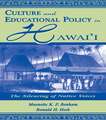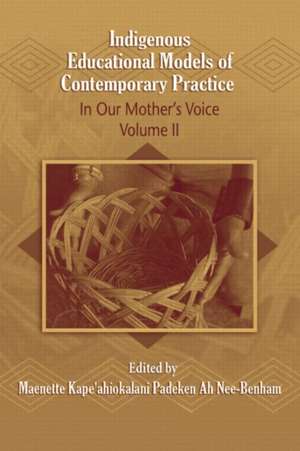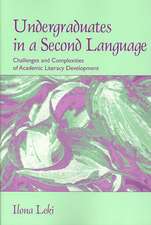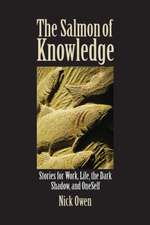Indigenous Educational Models for Contemporary Practice: In Our Mother's Voice, Volume II: Sociocultural, Political, and Historical Studies in Education
Editat de Maenette Kape'ahiokalani Padeken Ah Nee- Benhamen Limba Engleză Paperback – 25 iun 2008
- Regenerating and transforming language and culture pedagogy that reminds us that what is "Contemporary is Native"
- Living indigenous leadership that engages and ensures the presence, readiness, and civic work of our next generation of leaders
- Indigenizing assessment and accountability that makes certain that native values and strengths lead this important work
- Highlighting the power of partnerships that begin with the child-elder, which is then nurtured in community and institutions to cross boundaries of cultural difference, physical geography, native and non-native institutions and communities
| Toate formatele și edițiile | Preț | Express |
|---|---|---|
| Paperback (1) | 452.91 lei 6-8 săpt. | |
| Taylor & Francis – 25 iun 2008 | 452.91 lei 6-8 săpt. | |
| Hardback (1) | 1222.36 lei 6-8 săpt. | |
| Taylor & Francis – 20 iun 2008 | 1222.36 lei 6-8 săpt. |
Din seria Sociocultural, Political, and Historical Studies in Education
-
 Preț: 268.53 lei
Preț: 268.53 lei -
 Preț: 370.47 lei
Preț: 370.47 lei - 8%
 Preț: 376.19 lei
Preț: 376.19 lei -
 Preț: 347.45 lei
Preț: 347.45 lei -
 Preț: 453.89 lei
Preț: 453.89 lei -
 Preț: 447.14 lei
Preț: 447.14 lei -
 Preț: 431.95 lei
Preț: 431.95 lei - 18%
 Preț: 1001.90 lei
Preț: 1001.90 lei -
 Preț: 455.84 lei
Preț: 455.84 lei -
 Preț: 303.63 lei
Preț: 303.63 lei -
 Preț: 484.04 lei
Preț: 484.04 lei -
 Preț: 477.56 lei
Preț: 477.56 lei -
 Preț: 392.50 lei
Preț: 392.50 lei - 18%
 Preț: 1000.30 lei
Preț: 1000.30 lei -
 Preț: 360.30 lei
Preț: 360.30 lei - 15%
 Preț: 682.06 lei
Preț: 682.06 lei -
 Preț: 395.93 lei
Preț: 395.93 lei -
 Preț: 470.43 lei
Preț: 470.43 lei -
 Preț: 395.63 lei
Preț: 395.63 lei -
 Preț: 437.71 lei
Preț: 437.71 lei -
 Preț: 448.12 lei
Preț: 448.12 lei - 18%
 Preț: 1111.58 lei
Preț: 1111.58 lei - 18%
 Preț: 954.50 lei
Preț: 954.50 lei -
 Preț: 476.60 lei
Preț: 476.60 lei - 18%
 Preț: 1000.27 lei
Preț: 1000.27 lei - 26%
 Preț: 258.30 lei
Preț: 258.30 lei - 18%
 Preț: 999.98 lei
Preț: 999.98 lei - 18%
 Preț: 1057.75 lei
Preț: 1057.75 lei -
 Preț: 304.73 lei
Preț: 304.73 lei - 29%
 Preț: 260.73 lei
Preț: 260.73 lei - 26%
 Preț: 872.70 lei
Preț: 872.70 lei - 18%
 Preț: 1109.99 lei
Preț: 1109.99 lei -
 Preț: 383.75 lei
Preț: 383.75 lei -
 Preț: 386.94 lei
Preț: 386.94 lei -
 Preț: 403.65 lei
Preț: 403.65 lei - 15%
 Preț: 565.78 lei
Preț: 565.78 lei
Preț: 452.91 lei
Nou
Puncte Express: 679
Preț estimativ în valută:
86.67€ • 94.12$ • 72.81£
86.67€ • 94.12$ • 72.81£
Carte tipărită la comandă
Livrare economică 22 aprilie-06 mai
Preluare comenzi: 021 569.72.76
Specificații
ISBN-13: 9780805864038
ISBN-10: 0805864032
Pagini: 304
Dimensiuni: 152 x 229 x 18 mm
Greutate: 0.39 kg
Ediția:1
Editura: Taylor & Francis
Colecția Routledge
Seria Sociocultural, Political, and Historical Studies in Education
Locul publicării:Oxford, United Kingdom
ISBN-10: 0805864032
Pagini: 304
Dimensiuni: 152 x 229 x 18 mm
Greutate: 0.39 kg
Ediția:1
Editura: Taylor & Francis
Colecția Routledge
Seria Sociocultural, Political, and Historical Studies in Education
Locul publicării:Oxford, United Kingdom
Cuprins
@contents: Selected Contents
Table of Contents
Foreword Valorie Johnson, W.K. Kellogg Foundation
Series Editor Foreword Joel Spring, Series Editor
Preface Maenette K.P, Ah Nee-Benham
Section I: New Horizons for Language and Culture
Basket as Metaphor: The Base of the Basket, Samuel Suina
Opening Recitation: Ganönyö:k, Seneca Thanksgiving Speech, Larry E. Wheeler
1: Introduction: Go to the Source: The Contemporary is Native
2: Creating Culture in the Here and Now: Regenerating Rituals in Purposeful Epistemologies, Tarajean Yazzie-Mintz
3: Transforming the Self: Living-into “Contemporary is Native”
Becoming and Being, Teresa Magnuson
Honoring Our Role as Fathers, Jeremy Garcia
4: Generating a Sustainable Legacy: Teaching Founded Upon the Kumu Honua Mauli Ola, Kalena Silva, Makalapua Alencastre, Keiki Kawai‘ae‘a, and Alohalani Housman
5: “Ho?i hou i ke kumu!” Teachers as Nation Builders, Keiki Kawai‘ae‘a
Section II: Leadership is Living Indigenous in a New Way
Basket as Metaphor: The Shaping of the Basket, Samuel Suina
1: Living Leadership, Maenette K.P. Ah Nee-Benham
2: The Stories Inside, Edyael Casaperalta
3: What Does It Mean to Lead and Advocate for Our A’ani Language? Lynette Stein-Chandler
4: Life Lessons From the Land: Loko Kuapa as Leadership Model, Noelani Lee
5: Leading in Relationship, Learning From Our Youths, Malia Villegas
6: Gustango Gold: Lessons in Leadership From Corn, Lawrence E. Wheeler
7: Leadership Defined By Action: “Lead by Example”, Theresa Jackson
8: A Journey Home: Did We Ever Leave? Jeremy Garcia
9: From Indian to Odawa, A Journey Toward Understanding Identity, Matthew VanAlstine
10: Passing the Torch: Preserving the Flame, Teresa Magnuson
11: Awakening the Power Within, Lai-Lani Ovalles
12: What’s Next? Maenette Benham
Section III: Indigenizing Accountability and Assessment
Basket as Metaphor: Weaving the Basket, Samuel Suina
1: A Story Shared, Katherine Tibbetts, Susan Faircloth and Maenette Benham, with Tamarah Pfeiffer
2: Our Stories – Turning Our Gaze Inward
a) Making Assessment Personal: The Relevance of Local Knowledge and Holding Oneself Accountable, Susan Faircloth
b) Making Assessment Data Meaningful: Rigor that is Purposeful and Culturally Grounded, Malia Villegas
c) Making Assessment Matter: All Our Relations, Lawrence Wheeler
d) Making Assessment Indigenous: Reflecting the Reciprocal Nature of Learning, Katherine Tibbetts and K? Kahakalau
5: Looking Forward, Katherine Tibbetts and Susan Faircloth
Section IV: The Promise and Joy of Partnerships
Basket as Metaphor: The Braid Links All Parts of the Basket, Samuel Suina
A Poem of Partnership, Lai-Lani Ovalles & Partners
1: The foundational partnership: Learning from the Voices of our Elders, Maenette Ah Nee-Benham and Francisco Guajardo
2: The Heart of the Story: Framing Partnerships, Francisco Guajardo
3: Teaching Cases, Reflections, and Commentaries
a) Cultural Partnerships Confront School Culture, Jeremy Garcia (Mentor, Michael Pavel)
o Commentaries: Iris PrettyPaint and Shelly Valdez
o Reflections on the Case: Jeremy Garcia and Michael Pavel
b) Threats to Our Ancient Partnership With the Land: Molokai Nui a Hina, Noelani Lee (Mentor, Julie Kaomea)
o Commentaries: Troy Richardson and N?lani Wilson
o Reflections on the Case: Noelani Lee and Julie Kaomea
c) Maintaining Your Mission While Partnering With People, Educational Institutions, and Communities, Lynette Stein-Chandler (Mentor, Katie Cherrington)
o Commentaries: Mindy Morgan and Mary Eunice Romero-Little
o Reflections on the Case: Lynette Stein-Chandler and Katie Cherrington
d) Tribal Nation Community and Mainstream Institution Partnerships, Matthew VanAlstine (Mentor, Wayne Stein)
o Commentaries: Bryan McKinley Jones Brayboy and Paul Johnson
o Reflections on the Case: Matthew VanAlstine and Wayne Stein
e) “Young Man . . . Turn That Camera On. . . . Stories on Cross-Cultural Connections, Francisco Guajardo (Mentees: Edyael Casaperalta and Lai-Lani Ovalles)
o Commentaries: Teresa L. McCarty and J. Kehaulani Kauanui
o Reflections on the Case: Francisco Guajardo, Edyael Casaperalta, and Lai-Lani Ovalles
Section V: Reflections on Our Work
Challenge to All Indigenous Scholar-Practitioners, Henrietta Mann
Table of Contents
Foreword Valorie Johnson, W.K. Kellogg Foundation
Series Editor Foreword Joel Spring, Series Editor
Preface Maenette K.P, Ah Nee-Benham
Section I: New Horizons for Language and Culture
Basket as Metaphor: The Base of the Basket, Samuel Suina
Opening Recitation: Ganönyö:k, Seneca Thanksgiving Speech, Larry E. Wheeler
1: Introduction: Go to the Source: The Contemporary is Native
2: Creating Culture in the Here and Now: Regenerating Rituals in Purposeful Epistemologies, Tarajean Yazzie-Mintz
3: Transforming the Self: Living-into “Contemporary is Native”
Becoming and Being, Teresa Magnuson
Honoring Our Role as Fathers, Jeremy Garcia
4: Generating a Sustainable Legacy: Teaching Founded Upon the Kumu Honua Mauli Ola, Kalena Silva, Makalapua Alencastre, Keiki Kawai‘ae‘a, and Alohalani Housman
5: “Ho?i hou i ke kumu!” Teachers as Nation Builders, Keiki Kawai‘ae‘a
Section II: Leadership is Living Indigenous in a New Way
Basket as Metaphor: The Shaping of the Basket, Samuel Suina
1: Living Leadership, Maenette K.P. Ah Nee-Benham
2: The Stories Inside, Edyael Casaperalta
3: What Does It Mean to Lead and Advocate for Our A’ani Language? Lynette Stein-Chandler
4: Life Lessons From the Land: Loko Kuapa as Leadership Model, Noelani Lee
5: Leading in Relationship, Learning From Our Youths, Malia Villegas
6: Gustango Gold: Lessons in Leadership From Corn, Lawrence E. Wheeler
7: Leadership Defined By Action: “Lead by Example”, Theresa Jackson
8: A Journey Home: Did We Ever Leave? Jeremy Garcia
9: From Indian to Odawa, A Journey Toward Understanding Identity, Matthew VanAlstine
10: Passing the Torch: Preserving the Flame, Teresa Magnuson
11: Awakening the Power Within, Lai-Lani Ovalles
12: What’s Next? Maenette Benham
Section III: Indigenizing Accountability and Assessment
Basket as Metaphor: Weaving the Basket, Samuel Suina
1: A Story Shared, Katherine Tibbetts, Susan Faircloth and Maenette Benham, with Tamarah Pfeiffer
2: Our Stories – Turning Our Gaze Inward
a) Making Assessment Personal: The Relevance of Local Knowledge and Holding Oneself Accountable, Susan Faircloth
b) Making Assessment Data Meaningful: Rigor that is Purposeful and Culturally Grounded, Malia Villegas
c) Making Assessment Matter: All Our Relations, Lawrence Wheeler
d) Making Assessment Indigenous: Reflecting the Reciprocal Nature of Learning, Katherine Tibbetts and K? Kahakalau
5: Looking Forward, Katherine Tibbetts and Susan Faircloth
Section IV: The Promise and Joy of Partnerships
Basket as Metaphor: The Braid Links All Parts of the Basket, Samuel Suina
A Poem of Partnership, Lai-Lani Ovalles & Partners
1: The foundational partnership: Learning from the Voices of our Elders, Maenette Ah Nee-Benham and Francisco Guajardo
2: The Heart of the Story: Framing Partnerships, Francisco Guajardo
3: Teaching Cases, Reflections, and Commentaries
a) Cultural Partnerships Confront School Culture, Jeremy Garcia (Mentor, Michael Pavel)
o Commentaries: Iris PrettyPaint and Shelly Valdez
o Reflections on the Case: Jeremy Garcia and Michael Pavel
b) Threats to Our Ancient Partnership With the Land: Molokai Nui a Hina, Noelani Lee (Mentor, Julie Kaomea)
o Commentaries: Troy Richardson and N?lani Wilson
o Reflections on the Case: Noelani Lee and Julie Kaomea
c) Maintaining Your Mission While Partnering With People, Educational Institutions, and Communities, Lynette Stein-Chandler (Mentor, Katie Cherrington)
o Commentaries: Mindy Morgan and Mary Eunice Romero-Little
o Reflections on the Case: Lynette Stein-Chandler and Katie Cherrington
d) Tribal Nation Community and Mainstream Institution Partnerships, Matthew VanAlstine (Mentor, Wayne Stein)
o Commentaries: Bryan McKinley Jones Brayboy and Paul Johnson
o Reflections on the Case: Matthew VanAlstine and Wayne Stein
e) “Young Man . . . Turn That Camera On. . . . Stories on Cross-Cultural Connections, Francisco Guajardo (Mentees: Edyael Casaperalta and Lai-Lani Ovalles)
o Commentaries: Teresa L. McCarty and J. Kehaulani Kauanui
o Reflections on the Case: Francisco Guajardo, Edyael Casaperalta, and Lai-Lani Ovalles
Section V: Reflections on Our Work
Challenge to All Indigenous Scholar-Practitioners, Henrietta Mann
Recenzii
"Many educational traditions and practices have been lost or only remain in the memories of survivors of the indigenous peoples’ holocaust while other educational traditions have remained active. Indigenous Educational Models for Contemporary Practice provides educational models that affirm the vitality of these traditions and their adaptability to contemporary times…. It is my hope and belief that the educational models described in this book will help put students, teachers, and the world on the path to harmony and hope."--Joel Spring, Queens College, City University of New York, USA, from the Series Editor Foreword
"As I began to read, I started to feel excited by the idea of teaching this book, of using it in my work to prepare educators for urban and rural classrooms. It is a superlative example of what I am trying to convey to future teachers about epistemological diversity, and the need to recognize the rich, often untranslatable, sometimes dissonant ways of knowing and beliefs about knowing that students bring to classrooms. Further, the volume serves as a radiant counterpoint to neoliberal logic—a logic so naturalized in the West that it stands in for reason, while circumventing alternative worldviews….the book is dynamic, poetic, precise, recursive."—wicazo sa, a Journal of Native American Studies
"As I began to read, I started to feel excited by the idea of teaching this book, of using it in my work to prepare educators for urban and rural classrooms. It is a superlative example of what I am trying to convey to future teachers about epistemological diversity, and the need to recognize the rich, often untranslatable, sometimes dissonant ways of knowing and beliefs about knowing that students bring to classrooms. Further, the volume serves as a radiant counterpoint to neoliberal logic—a logic so naturalized in the West that it stands in for reason, while circumventing alternative worldviews….the book is dynamic, poetic, precise, recursive."—wicazo sa, a Journal of Native American Studies
Descriere
The book challenges teachers, researchers, educational leaders, and community stakeholders to build dynamic learning environments through which indigenous learners can be "Boldly Indigenous in a Global World!" It honors the wisdom of ancestors, highlights the diversity of indigenous stories, and illuminates the passion of forward-looking scholars.















